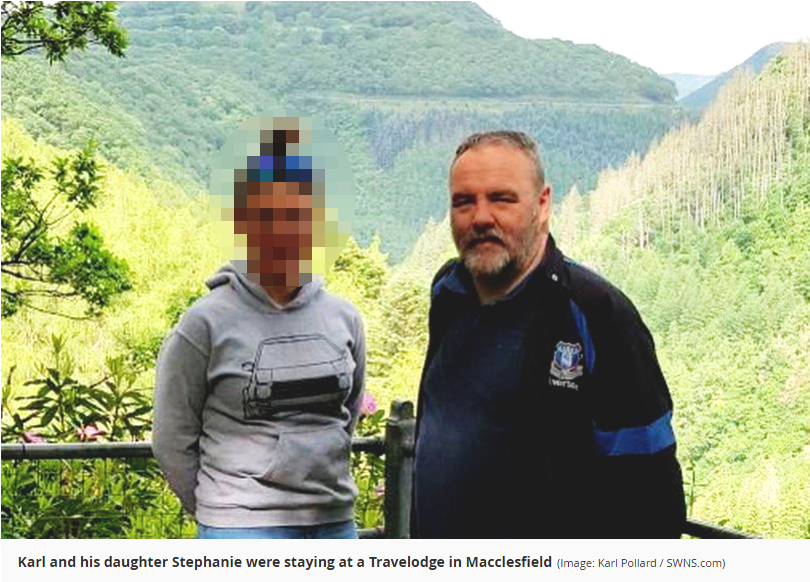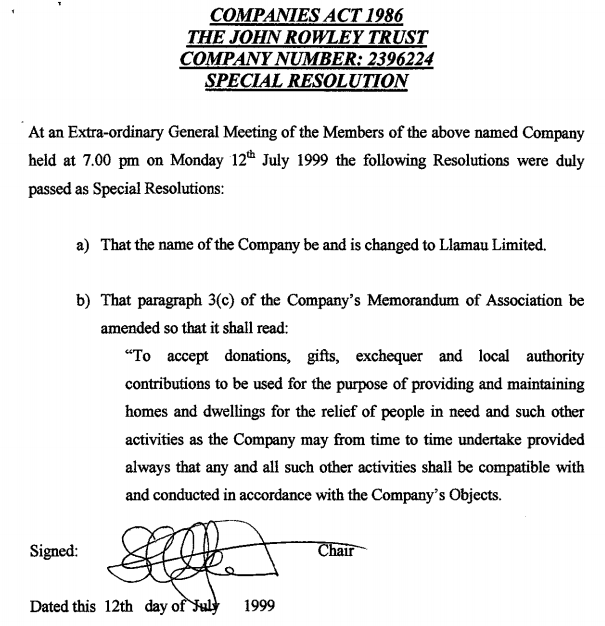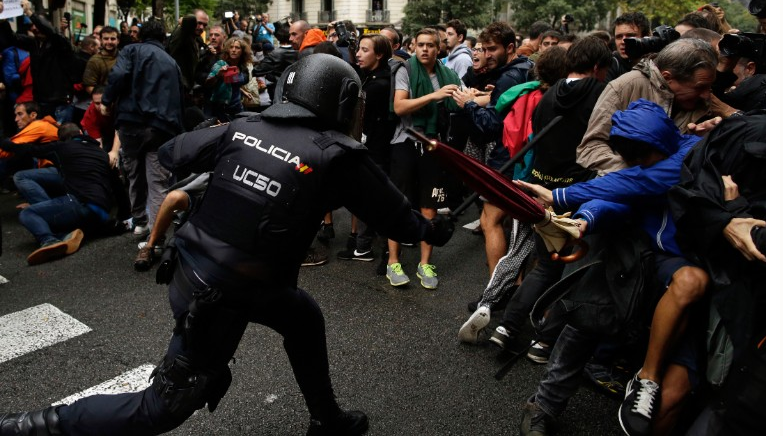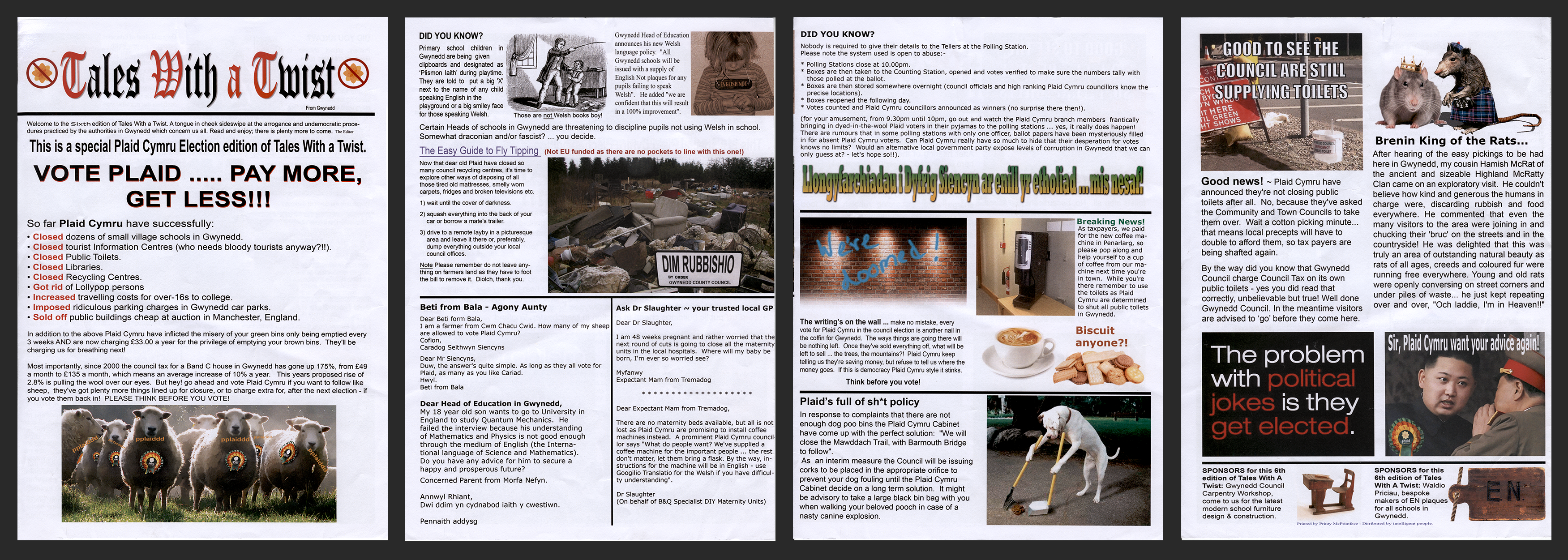UNCRITICAL PUBLICITY
Over recent years, at the prompting of political friends of the homelessness industry, both BBC Wales and the print media have given television series and pages of newsprint so that the countless competing and duplicating businesses in the sector can promote themselves and their ‘mission’.
To my knowledge, nothing even vaguely critical of the homelessness racket has been allowed. It’s the sort of publicity other commercial enterprises usually have to pay for.
But this free publicity is not restricted to companies in the homelessness business, it covers all bodies operating in the third sector, to the extent that the third sector has achieved the status of royalty or dead heroes in that it’s beyond criticism.
If nothing else, this exposes yet again the problems caused to Wales and Welsh public life by the incestuous little world we know as the Cardiff Bay Bubble.
We saw it with the death of Carl Sargeant and we see it again in the crucifixion of Neil McEvoy. A politician’s political or personal enemies ask a lobbying outfit to get some friend in the third sector to make a silly claim of harassment, or bullying, or bum-touching.
The victimisation process might even be initiated by the lobbyists themselves. (‘Shame on you!’ I hear.)
Then it’s a case of all girls together and another poor man-beast is brought down.
Another part of the Bay Bubble is the ‘Welsh’ media, which cannot criticise the third sector, stuffed with Labour Party members and supporters, without offending the Labour Party itself. So the third sector gets the kind of kid-glove treatment I’ve just described.
So who loses out? You and me, my friend, and the 99.9% of Wales lying outside of the Cardiff Bay Bubble.
◊
WCVA STEPS IN WITH DIRE WARNINGS
Earlier this month the Wasting Mule ran a big publicity puff and funding appeal (masquerading as a news story) for the Wales Council for Voluntary Action, in which CEO Ruth Marks told us that the “voluntary sector” is worth £1bn but she’s worried about reducing funding. Note the use of the term “voluntary sector”.

Ms Marks quoted spurious figures which I’ve highlighted. For example, the figure she uses for ‘England’ almost certainly includes UK-wide bodies based in England and even international agencies such as Oxfam and Save the Children.
The only valid comparison would be England-only agencies with Wales-only agencies. Because I know damn well that in England a Tory Government, and Tory-controlled local authorities, do not throw money at the third sector in the manner of Welsh socialist politicians maintaining their system of patronage.
This reluctance to fund the third sector in England explains why so many third sector operatives have flocked to Wales since we’ve had devolution and Labour dishing out the loot.
Another interesting claim is that the third sector accounts for 10% of Welsh employment. Seeing as these jobs are almost entirely reliant on public funding they could be equated to paying benefit. Or, to be more generous, seeing as many third sector activities are ‘outsourced’ transferring from the public sector to the third sector just re-labels existing jobs.
Then again, the “voluntary sector” means unpaid work, so how can it account for 10% of Welsh employment? She must be confused, or perhaps hoping to confuse us.
After studying the third sector in Wales for many years I know there is a deliberate attempt to mislead or deceive in almost everything the third sector says and does. That’s because there’s a lot of money involved and many careers; the third sector is often a stepping stone to a political career, or it provides a nice retirement job after leaving politics.
But to enjoy these benefits you must be in the ‘club’. And membership is restricted to the Labour Party, with Plaid Cymru – in return for political support – allowed to feed off the scraps.
◊
WCVA GETS REALLY DIRE
Just nine days after the Ruth Marks piece in Llais y Sais, the WCVA was back with a full-page article written by Anna Nicholl, Director of Strategy and Sector Development.

Don’t get me wrong, there’s nothing like grabbing the reader’s attention with the first few lines, just think of: “Last night I dreamt I went to Manderley again”, or “All happy families are alike, each unhappy family is unhappy in its own way”, and of course, “It is a truth universally acknowledged, that a single man in possession of a good fortune, must be in want of a wife”.
But when I read, “To my mind, the very fabric of Welsh life depends on the survival of the third sector”, the needle on the old hypocrisy meter went off the dial. While the bollocks detection equipment just blew up from some kind of power surge. (You should have seen the cat move!)

To believe Anna Nicholl, the third sector is all that saves our beloved homeland from the ravages of the Four Horsemen.
Whereas the truth is that many Welsh communities are being damaged by the criminals, addicts, problem families and others imported by many third sector bodies (and here I include housing associations). Because once you’ve found your racket, and got your funding, you need a steady supply of ‘clients’ to keep the funding flowing, and if Wales can’t provide enough ‘clients’ then you have to look elsewhere.
Earlier I wrote, “there is a deliberate attempt to mislead or deceive in almost everything the third sector says and does”. This article by Anna Nicholl proves my point. But for anyone in doubt, let me spell it out.
On the one hand we have the kind of third sector body represented by the WCVA, such as homelessness company Llamau, with its 266 employees, spending over 70% of its £10m+ annual income on salaries, and paying its CEO £80,000+. Llamau is obviously not a voluntary organisation – it is a business.
Worst of all, it is a publicly-funded business competing with too many other, publicly-funded businesses.
By comparison, Mrs Williams (Troedyrhiw) who you encounter on the High Street, and who puts a sticky badge on your chest for dropping a washer or two in her tin (I always carry some), is a volunteer, because she performs this work for nothing.
Which is not to say that the organisation Mrs Williams collects for doesn’t have paid officials higher up its food chain, but these are charities in that they rely on donations from the public – not government funding.
Another kind of voluntary group is that we see in the picture used to illustrate the Anna Nicholl article, a local group trying to improve its neighbourhood, and with groups such as this there is usually no money involved at all!
So why use a picture like that if it’s not an attempt to mislead or deceive those reading the article?
In fact, Ms Nicholl gives the game away with the wording of the caption accompanying her photo: ” . . . the vital third sector, such as voluntary organisations”. But ‘voluntary organisations’ are only a small part of the third sector, and here they’re being used as a fig leaf.
The good news might be that the WCVA realises that the kind of organisations I criticise are now beyond defending, the only hope being to confuse them in the public mind with ‘voluntary organisations’.
◊
AN ATTEMPT AT BALANCE
After reading Anna Nicholl’s deliberate confusion or conflation of voluntary groups with the avaricious money-grabbers the WCVA really represents I was moved to write to the Western Mail. So I sent my e-mail and got a quick response asking for my full address.
So we know they have my letter for publication, will they now have the balls to publish it, unedited? Just in case, here it is.
“It seems that in recent weeks the third sector has felt the need to defend itself. Presumably in an effort to help, the Western Mail ran a big piece on the 8th quoting Ruth Marks, Wales Council for Voluntary Action CEO; and then on the 16th we had a full-page article by Anna Nicholl, Director of Strategy and Sector Development at the WCVA.
This later article was accompanied by a big picture of a mother and child picking up litter, as an example of the ‘voluntary groups’ the WCVA claims to represent, and on which “Welsh life depends”, according to Ms Nicholl. The picture was cute, but deliberately misleading.
I have criticised the third sector over many years, principally on my blog, ‘Jac o’ the North’, but I have never criticised voluntary groups, nor charities with an obvious purpose such as the RNLI. My criticism has been reserved for what can only be described as self-serving, third sector businesses.
Many of which get millions of pounds in public funding every year, with most of the money going in salaries. And a hefty chunk of that salary funding going to the CEO, who is invariably a Labour Party member or supporter, and often from outside of Wales.
As if that isn’t bad enough, we have the duplication to consider. In a recent FoI response from the ‘Welsh’ Government I was told that there are 48 bodies in Wales dealing with homelessness. That’s forty-eight in a country of 3 million people.
Having identified an ‘issue’ to exploit it then becomes imperative for third sector bodies to have a steady supply of ‘clients’ in order to ensure the continuation of the generous funding. To meet this need often means importing undesirables from outside of Wales.
One Cardiff-based housing association is currently wreaking havoc in Lampeter with the drug dealers and others it’s housing in that hitherto peaceful town – and it has applied to Ceredigion council for permission to convert more buildings to one-bed flats in order to bring in more misfits! And remember – this is being paid for from the Welsh public purse!
How can we explain this apparent idiocy? The answer lies in the fact that the third sector is, as I’ve suggested, an extension of the Labour Party.
On one level, the third sector is pure cronyism in that it provides thousands of jobs for Labour supporters. On another level, the size of the third sector is used to indicate how poor Wales is, and of course it’s always someone else’s fault – so ‘Vote Labour!’
Which means that the third sector exploits and entrenches Wales’ poverty for the benefit of those working in it and for the electoral advantage of the Labour Party.
If the hundreds of millions of pounds poured into the third sector every year was used to encourage entrepreneurship and invite investment Wales would be much better off, but would also be less likely to vote Labour.
All of which means that the unnecessary, crony-filled and duplicating third sector bodies I’m dealing with have nothing in common whatsoever with mothers and children picking up litter in their local park.”
♦ end ♦
UPDATE 20.03.2018: Chwarae teg, the WM published the letter in full today.
















 Clearly, the Spanish Government’s demonstration of ruthless and brute force was, and is, a reminder that in Europa fascism is alive and well, that the spirit of Generalissimo Franco of Spain is not dead. Brussels, miserable, spineless puppets to the transatlantic empire and the European oligarchy, remained shamefully silent – arguing it was a Spanish internal affair, as if Spain, a full member of the EU isn’t a European Union’s ‘internal affair’.
Clearly, the Spanish Government’s demonstration of ruthless and brute force was, and is, a reminder that in Europa fascism is alive and well, that the spirit of Generalissimo Franco of Spain is not dead. Brussels, miserable, spineless puppets to the transatlantic empire and the European oligarchy, remained shamefully silent – arguing it was a Spanish internal affair, as if Spain, a full member of the EU isn’t a European Union’s ‘internal affair’.
 President Rajoy lauding the violent police that left hundreds of inured, many seriously wounded, is yet another testimony that fascism and Fascist mentality of some states in Europe is alive and well, and seemingly increasing. Franco’s blood must be running in Rajoy’s veins. Brussels, the headquarters of the European Police state – of the growing European military regime – already today engulfing the bulk of the 28 EU member states, concurred with this violence by remaining disgracefully silent. How much of the true news about this deplorable event did you hear from the British Bullshit Corporation and other conforming ‘official’ puppet news outlets controlled by the governments?
President Rajoy lauding the violent police that left hundreds of inured, many seriously wounded, is yet another testimony that fascism and Fascist mentality of some states in Europe is alive and well, and seemingly increasing. Franco’s blood must be running in Rajoy’s veins. Brussels, the headquarters of the European Police state – of the growing European military regime – already today engulfing the bulk of the 28 EU member states, concurred with this violence by remaining disgracefully silent. How much of the true news about this deplorable event did you hear from the British Bullshit Corporation and other conforming ‘official’ puppet news outlets controlled by the governments? Looking at history, Cataluña became part of Spain in the 15th Century under King Felipe VI and Queen Isabella. In the 20th Century, under the Spanish Republic, Cataluña with, like us, her own culture and language, received full autonomy in 1932. It was abolished by Franco, when he came to power in 1938. After Franco’s death in 1975, Cataluña regained temporary autonomy which lapsed in 2006, when a Spanish High Court challenged the Statute of Autonomy and ruled some articles of the Statute ‘unconstitutional’. That was the time when the most recent Catalan Independence Movement began. Since then several mock referenda took place, including the latest in 2014, when 80% of those who voted (about 30% of eligible voters) opted for independence.
Looking at history, Cataluña became part of Spain in the 15th Century under King Felipe VI and Queen Isabella. In the 20th Century, under the Spanish Republic, Cataluña with, like us, her own culture and language, received full autonomy in 1932. It was abolished by Franco, when he came to power in 1938. After Franco’s death in 1975, Cataluña regained temporary autonomy which lapsed in 2006, when a Spanish High Court challenged the Statute of Autonomy and ruled some articles of the Statute ‘unconstitutional’. That was the time when the most recent Catalan Independence Movement began. Since then several mock referenda took place, including the latest in 2014, when 80% of those who voted (about 30% of eligible voters) opted for independence.








































